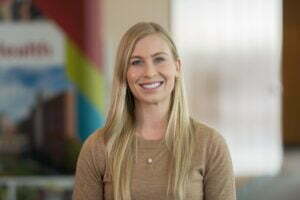Member Insight – Kelli Gribben
 What sparked your decision to become an epidemiologist?
What sparked your decision to become an epidemiologist?
I have always been interested in science and helping people, but it wasn’t until I took an elective field epi course during a summer in undergrad that I decided to pursue a career in epidemiology. My “aha!” moment was when I learned I could combine all of my interests in human biology, nutrition, and statistics towards improving health of populations.
What do you see as the biggest obstacle facing epidemiologists in the next five years?
I can’t say what the biggest obstacle facing epidemiologists will be, but some areas of concern are combating the spread of scientific misinformation, finding more effective ways of communicating with the public to establish and sustain trust in public health messaging and data, and creating a culture of inclusiveness in everything we do.
Do you have any pets?
Yes, I have a fluffy black cat named Chanel. She is just as chic as her name suggests.
Why did you join SER? What keeps you coming back?
Initially, I joined SER as a PhD student to take advantage of all the educational and professional development resources, and to grow my professional network. I keep coming back because of the wonderful people and excellent educational resources SER provides! I’m proud to be active on the Membership and Nominations committee and through my involvement I’ve met the best colleagues and have enjoyed working on initiatives to engage with our clinically-focused members.
What advice do you give students who want to become epidemiologists?
So much advice because I’m a recent grad. 1) Gain as much experience as you can early on while you’re a student but be thoughtful and consider what you will learn (e.g. data analysis, scientific writing, presentation skills) from each opportunity because your time is valuable and you cannot and should not do it all. 2) Advocate for yourself on projects. If there is a skill you want to learn or apply let your team lead or faculty advisor know. 3) Listen to your instructors and mentors when they provide feedback (good and bad) and if they don’t, ask for it. 4) Lastly, look at the stated requirements in job postings for positions you’re interested in following graduation to ensure you will gain the necessary knowledge and skills through your coursework or other activities.
Outside of epidemiology what do you enjoy doing?
I love to run, spend time with family and friends, especially my 15-month-old daughter, read, and try new restaurants.
What is something that not many people know about you?
When I was young, I was a competitive clogger! Our group also performed tap and jazz dance routines.
